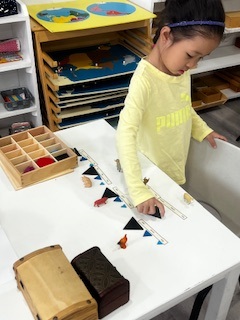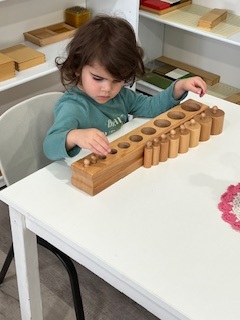Our Montessori Principles
Montessori education is built on a deep respect for the child and their natural drive to learn. Rooted in scientific observation, the Montessori method views education as both a partnership and an aid to life itself.
At the heart of the Montessori classroom is a carefully prepared environment. Thoughtfully designed materials invite purposeful work, encouraging independence, focus, and exploration. Children are free to choose their activities, work at their own pace, collaborate with others, and contribute to the community.
Montessori felt that the child knows best what is needed for his/her self-construction. Self-education allows for the greatest growth and gives rise to positive attitudes towards learning. When children are involved in their education, they develop confidence in their ability to learn.
Dr. Maria Montessori believed that children are innately driven to build themselves. Through self-directed learning, they develop confidence, curiosity, and a lifelong love of discovery. Montessori education nurtures the whole child—intellectually, emotionally, socially, and physically.
 There are no imposed limits or rigid expectations. Instead, each child is guided to reach their full potential through freedom within structure. They gain the ability to think critically, act with intention, and grow into responsible, compassionate members of society.
There are no imposed limits or rigid expectations. Instead, each child is guided to reach their full potential through freedom within structure. They gain the ability to think critically, act with intention, and grow into responsible, compassionate members of society.
True peace begins with the individual. When children are respected, understood, and given the tools to thrive, they develop a strong sense of purpose, belonging, and responsibility. From this foundation, peace becomes not only possible, but inevitable.


